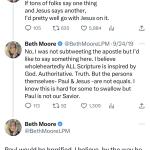Don’t Call It Burn Out
Andrew Lang’s recent article detailing his reasons for leaving the pastorate generated many responses, including mine. One published response caught my attention. Ordinarily, a response to an article like his does not merit a separate response because one gets to the point of diminishing returns. Todd Thomason’s article, Don’t Call It Burn-Out in Baptist News Global, however, is an exception. It demands a response.
In it, Thomason takes exception to those calling Lang’s departure “burnout.” Burnout is not the appropriate term to describe leaving ministry because job stressors. Thomason sees many sources of stress in ministry:
…Unreasonable expectations, a nearly impossible job description, constantly changing goalposts, ideological entrenchment, political grandstanding, gaslighting, the perpetual undermining of new initiatives from within, internal factions actively attempting to oust you from your job. These are not saturations that lead to “burn-out.” This is not having too much of something you love. These are forms of institutional sabotage.[1]
Many pastors would agree that ministry is stressful. On the other hand, I know of no important job that is not stressful. It is fine if the stresses get to be too much. It is no failure to say, “I cannot do what the Church expects me to do right now.” Perhaps it is even helpful to state that the role of the pastor needs to change. What is not helpful is taking the stress the pastoral role places on ministers and using them as a reason to besmirch the Church.

Some Pastors Do Not Like The Church
In reading both Lang and Thomason’s articles it is hard to avoid the impression that they do not like the Church. They may disagree with that assessment, but their language sounds harshly dismissive and contemptuous. Thomason writes that the congregations who called him to be their pastor only wanted a “manager for their Jesus club.”[2] These congregations were not interested in being the Church but only pretending to be the Church, he asserts. Although they called him to be the pastor, they made it impossible for him to “live out that calling,”[3] a euphemism devoid of meaning.
Lang describes all the reasons pastoring is difficult as well, but he makes some quite revealing comments afterward, “…Most Christians don’t want their thinking challenged.” He continues, “…Any learning should support the party line.” More than disliking the Church, he expresses contempt for other clergy because they do not share his nuance.[4]
These do not sound like the words of men who love the church. With the fury of a woman scorned, to borrow Shakespeare’s phrase, they pour out their complaints. The Church is not what they wanted it to be. When they tried to change the Church, their congregations resisted. “How dare they,” is the subtext here.
Where is the Compassion?
Missing is the compassion for the 88-year-old woman who attends every week. She carries a tattered black Bible in her left hand and clutches a brown purse in her right. She comes to hear of the Savior who lived and died so that she might rise again, so she might see her departed husband, gone 20 years now, again.

Where is the compassion for the single mother who comes? Her world is as frantic as a one-armed plate spinner. Somehow she manages to get her three kids dressed and out the door for worship. She thinks it is a victory if all of them are wearing shoes. “Stop screaming,” she yells for the 17th time this morning as the kids fight over a doll in the back seat of her minivan. She needs the hope of the faith transmitted to the Apostles.
What about the desperate man? Home life is terrible. The eyes that once lit up with delight at the mere mention of his name now become narrow slits of contempt at the idea that he draws breath. His work, always challenging, has become impossible because of time demands. It was the only place where he had comfort because it was the only thing remaining that he felt he did well. Now, it is a nightmare too. He comes to worship, needing to hear of the hope of Jesus Christ. Where is the compassion for him? There is none. No, he needs a “growth mentality.” He needs a Christianity transformed so that it is “worth believing in.”
Dismantling
What right do these men have to “dismantle” the beliefs of people like the ones above, to describe their church as “sewage?” What right do they have to take apart the Gospel and reassemble it into something else? The Church is a problem to be solved, not a people to be loved in their eyes. The problem is not with them, though, the problem is that the Church is defective and will not let them fix it. They know best. [5]
As an aside, the Church is the Bride of Christ. The Lord of the universe is her protector. I would tread very carefully comparing her to excrement.
Some Pastors Do Not Like Christianity
The idea that some pastors do not like Christianity might sound odd, but read Lang’s description on his About Us page on his website. The Gospel is not worth believing until it has been dismantled is his argument. Christianity is the belief that Jesus Christ, the Son of God, has risen from the dead. The Bible describes its doctrines. The Nicene Creed defines orthodoxy. If a person does not find it worth believing in as it is, then the pastorate is the wrong field.
What they and some other pastors I have read want to do is make Christianity into a social transformation society. The Gospel is not that, at least not directly. A central concept of the faith, the Image of God, does have societal implications, but getting from there to a particular politic is impossible. The Gospel is not a political handbook. The Trinity is not a social policy. Forcing it to be that is idolatry.
There Is Hubris Afoot
In short, I think the attitude of these authors is hubris. They think the Church is wrong on matters of life and faith and they are there to fix it. This attitude is deeply problematic. Pastors are there to serve the Lord and the Church. With compassion and grace, they are to lead. When the congregation is wrong, they are to lead them to a better place. They are shepherds, not CEOs.
Lang’s complaint, in particular, is a problem. It does not look like the resistance to his leadership was the problem. The resistance was the congregation doing its job. If a pastor preaches something outside the Gospel, if a pastor wants to make the Gospel something “worth believing” according to his dictates, congregants should resist. They were not wrong.
Congregations Can Be Maddening
It is important to state that congregations can be difficult. Any organization can, and I suppose every organization is. It is also true that denominations could intervene more, especially in connectional traditions. Pastors in difficult circumstances do need insight and coaching. All of these things are true. What is untrue is that the whole Church is the problem. Pastors like these should stop trying to make the Church over in their own image.
[1] https://baptistnews.com/article/dont-call-it-burn-out/
[2] https://baptistnews.com/article/dont-call-it-burn-out/
[3] https://baptistnews.com/article/dont-call-it-burn-out/
[4] https://www.restorativefaith.org/post/departure-why-i-left-the-church
[5] https://www.restorativefaith.org/copy-of-who-we-are-1th:











